Religious Liberty Dinner
Melissa Reid November/December 2008
Getting your Trinity Audio player ready...
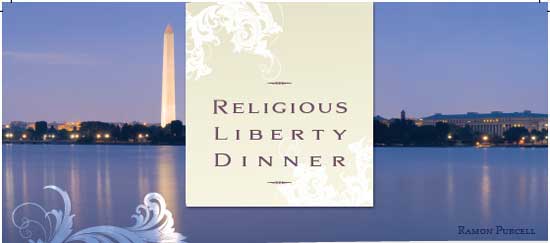
"I truly believe that this is the true mark of respect for religious freedom—when you stand up not only for your own rights, but when you also stand up for those of your neighbor, even when they believe something that may be radically different from you. You see, true tolerance is not in pretending that you have no differences; true tolerance is in loving and respecting your neighbor in spite of those differences," said Trent Franks, United States congressman (R-AZ-2nd) and co-chair of the Congressional Task Force on International Religious Freedom, at the sixth annual Religious Liberty Dinner, held at the Capital Hilton in Washington, D.C., June 12.
These remarks were part of his keynote address to dinner attendees, who included foreign ambassadors, federal government staffers, and leaders from the NGO and faith communities. Sponsored by Liberty magazine, the International Religious Liberty Association, and the North American Religious Liberty Association, the event is an opportunity to honor those who work to preserve religious freedom in the United States and champion its necessity abroad.
Rep. Franks told attendees that protecting religious freedom at home is key to ensuring similar freedoms around the world, and that "it's critical that other nations join with us in reaffirming this foundational human right and stand for the freedom of all people to choose their religious beliefs."
Honorees at this year's event included UC Davis School of Law professor Alan E. Brownstein, a nationally recognized constitutional law scholar whose assistance is often sought by advocacy groups on issues relating to religious liberty and equality; Zaoksky Adventist University Bible Translation Institute director Mikhail Kulakov, Sr., who endured persecution and imprisonment for his religious teachings and beliefs in the former Soviet Union; and former aid worker Carl Wilkens, who was stationed in Rwanda during the 1994 genocide, and stayed behind to help save hundreds of lives in Kigali.
"It is vital that we continue to make this annual statement for the importance of religious freedom in the capital of the United States of America," says Lincoln Steed, editor of Liberty, major financial sponsor of the event. "We will continue to honor individuals and nations like the United States for upholding this most indispensable of freedoms."
Melissa Reid, Associate Editor

Religious freedom is not only for Democrats or Republicans, Americans or Christians. It's a sacred right that all humanity should stand for. It's something that is written in our hearts. Alexander Hamilton, one of the architects of our republics, said it this way: "The sacred rights of mankind are not to be rummaged for among old parchments or musty records. They are written, as with a sunbeam, in the whole volume of human nature, by the hand of the divinity itself, and can never be erased." The Founding Fathers knew what it was about.
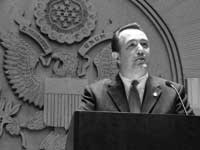
|
| Trent Frank is co-chair of the Congressional Task Force on International Religious Freedom. |
Early Christians also had a few struggles. Probably one of the most poignant verses to me is Hebrews 11:36, 37: "Others had trial of cruel mockings and scourgings, yea, moreover of bonds and imprisonment: They were stoned, they were sawn asunder, were tempted, were slain with the sword: they wandered about in sheepskins and goatskins; being destitute, afflicted, tormented."
Religious persecution and the battle for religious freedom are not new battles in this world, ladies and gentlemen. But one of the greatest hopes, one of the greatest steps towards religious freedom came when that moment in history occurred—when inspired by their own Christian faith, America's Founding Fathers penned those timeless words enshrined in our Declaration of Independence: "We hold these truths to be self-evident, that all men are created equal, that they are endowed by their Creator with certain unalienable rights, that among these are life, liberty, and the pursuit of happiness." Religious freedom is such an indigenous part of the pursuit of happiness in the Founding Fathers' minds. They understood what it really meant.
This is something that has set America apart from all nations across the world since that fundamental truth was written over 230 years ago. We hold that humanity has a choice to believe or not to believe, to worship or not to worship, and that freedom of religion is truly the cornerstone of all other human freedoms. In Thomas Jefferson's words, "The constitutional freedom of religion [is] the most inalienable and sacred of all human rights."
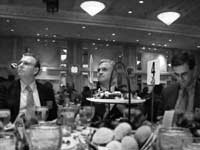
|
| (L to R) James Standish(NARLA), Ambassador John Hanford(US State Dept) and Eric Treene(US Dept of Justice). Standish was a co-organizer of the event |
Let me just say I believe that, as we do this across the world, we must make sure that our own base of freedom of religion in our country is also protected. Sometimes it's the water on the inside of the ship that sinks it, isn't it? But one of the great Founding Fathers, Daniel Webster, put it like this—and he was speaking of many constitutional rights, but the constitutional right to freedom of religion, was foremost in his mind. And he said: "Hold on, my friends, to the Constitution and to the Republic for which it stands. Miracles do not cluster, and what has happened once in 6,000 years may not happen again. Hold on to the Constitution, for if the American Constitution should fail, there will be anarchy throughout the world."
I am convinced that we have to protect religious freedom here at home so that we can be sure that we project it across the planet. It is vitally important.
Now, you know if religious freedom were not so intertwined with human dignity itself, and the human spirit, dictators would not be so threatened by it and work so hard to destroy it. But because it is, it should not surprise us that now, more than one half the world's population lives in countries where they do not have true religious freedom.
Today in Eritrea, Adventists and people of many other faiths endure particularly severe restrictions on their freedom because of their religious beliefs. In Eritrea, all religious communities have been forced to register with the government if they want to continue their activities legally. Despite having submitted all of the necessary materials to the authorities, including names of church members, the Eritrean government has not registered Adventists and many other religious communities. As a result these communities are unable to worship publicly, and their churches have been closed.
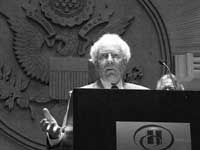
|
| Mikhail Kulakov, Sr. recongnized for his stand for religious freedom, even at the cost of imprisonment during the soviet years |
Helen Berhane, a famous Eritrean gospel singer, was held in a metal shipping container in the desert for two and a half years, constantly tortured and forced to recant her faith. When she was finally released, she had to flee the country entirely. Thousands of others sadly remain in these containers in the desert simply because the government does not like what they believe, and seeks to destroy their spirit.
But persecution is not confined to Eritrea, or to communists, or to religiously affiliated nations. Individuals are persecuted to varying degrees throughout the world, and no religious community has been unaffected—Baha'is are persecuted in Egypt, Christians in Cuba, Jehovah's Witnesses in Greece, Muslims in India, Buddhists in Burma, Hindus in Bangladesh, Catholics in China.
This year marks the tenth anniversary of the International Religious Freedom Act of 1998, in which Congress recognized the importance of this foundational human right, and made the promotion of protection of religious freedom a fundamental part of our nation's foreign policy.
I've introduced a resolution to commemorate this act, which also calls upon the United States and our government to continue to stand up for those suffering around the world under those governments that are trying, once again, to destroy their spirits. As a co-chair of the Congressional Task Force on International Religious Freedom, my office regularly meets with individuals who have been persecuted for their religious beliefs. We hold briefings and write letters to advocate for the persecuted of all faiths, and we've had what seem to be miraculous victories in so many areas—but there's always more work to do.
The contributions of organizations like the International Religious Liberty Association provide help that is vitally important to our efforts in helping the persecuted. Currently, most governments have agreed to the international standard for the right to freedom of religion, which entails the freedom to believe or not to believe; either alone or in your community; in public or in private; to practice your religion or belief through teaching, worship, and the observance of special holidays or the wearing of special religious symbols. But many increasingly view this right as a threat to their often dictatorial authority. The international standard for religious freedom must be reinforced and your work in this area is absolutely critical.
The International Religious Freedom Act sends a clear message to the world that this nation cares about the religious freedom of all people everywhere. And it's critical that other nations join with us in reaffirming this foundational human right, and stand for the freedom of all people to choose their religious beliefs. In so doing, ladies and gentlemen, I believe ultimately we will be protecting our own religious freedom, because, you know, somehow the environment that we work in and how we work to help others seems like it always comes home. I heard a little story years ago that touched my heart. And I think it, perhaps, is a way to bring this all together.
It so happens that off the coast of Scotland, many years ago, there was a shipwreck. They didn't really have a coast guard there, and a ship went to pieces in a storm. The townspeople went out to the coastline there to try to meet the people that were coming ashore. They came ashore in just the one lifeboat that they had on this large, wooden ship. And the first question was, "Did you get everybody?" The survivors responded, "No. We didn't get everybody. There are a lot of people still out there clinging to pieces of the ship." And townspeople said, "Yes, but there's still a storm. It's dangerous to send a rescue team out." And a man named John stepped forward and—it happens to be a true story—he said, "Who will go with me? We will take the lifeboat out. We'll take every other boat that we have and we will go out there and we will try to find the vicinity and bring home as many as we can."
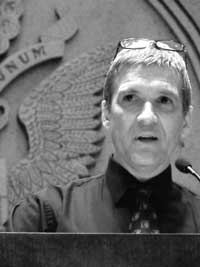
|
| Carl Wilkens captivated attendees with the retelling of his esperience in Rwanda during the genocide. |
But John said, "Mom, if I don't go, they'll all die." And so he left his mother crying there on the beach, and the people began to follow him because of his courage, and he went out into the storm to try to find these lost people. In a sense, you know, I suppose my own faith is about a Savior that went out into the storm to try to rescue his lost brothers and sisters.
The townspeople built a fire and they waited and they prayed, and they wanted to hope that somehow the rescue team would return. Finally, the storm calmed, and the night passed and it was the wee hours of the morning. Suddenly someone heard an oar out on the water. And those on shore called out, "Are you out there?" And a voice called back and said, "Yes, we're out here." They said, "Did you get everybody?" And they said, "Yes, we got everybody." Then John's voice yelled ashore and he said, "Tell my mother I'm OK. And tell her my brother William is with me."
And you know, that's really the way it is, folks. There is something in the heart of every last one of us that knows that this life is a miracle that beggars description or understanding. There is something in the hearts of all of us, telling us that when we look at the stars, beyond them is a God . . . who made them all. There is something in the hearts of all of us that knows our brothers and sisters are a profound creation of that . . . God. There is something in the hearts of all of us that sees the mortality of this life. We realize that this one ends in the short, brief time that we have with these flashes of light called days in our lives. And sooner or later, we have to step away from this life. And I really believe that the fight for religious freedom is so very important because of all those things, and maybe most of all it's important because someday we all pray that we will stand before God and say, "Lord! I am come safely home, and my brother William is with me."
Excerpted from the speech given by Representative Trent Franks (R-AZ-2nd) at the June 12, 2008, Religious Liberty Dinner at the Washington, D.C., Capital Hilton.
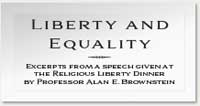
One of the things that I have learned over the years is that people of different faiths have to work together to protect religious liberty—not just for their own religious community, but for everyone. Let me be frank, here. Even when diverse religious communities work together on a religious liberty case or bill, that still does not guarantee success. I know that when we fight these battles together, we are not always going to win. But I also know that if religious communities go their own way and don't stand together and support each other, it is much more likely that we are going to lose. And I do not know any other organization in California that has been as effective in bringing religious communities together to work for the religious liberty of everyone as the Seventh-day Adventist Church State Council.
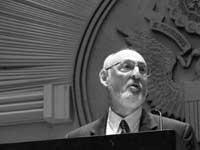
|
| Alan E. Brownstein is a constitutional law scholar at the University of California, Davis, School of Law. He was recognized for his scholarship and advocacy of religious freedom |
Eighty years later, we added one other critical guarantee to our constitutional framework. After a terrible civil war, we committed ourselves not only to liberty, but also to equality. We finally recognized that government cannot create a hierarchy that ranks the status of its citizens based on their race or national origin or religion.
If we honor these principles of religious liberty and equality, we, and our children, and our children's children can live in a country and a world where we are free to believe as we choose, according to the dictates of our conscience, and where our government will recognize that the members of both majority faiths and minority faiths are of equal worth and must be treated with equal respect.
Article Author: Melissa Reid
Melissa Reid is the associate editor of Liberty.